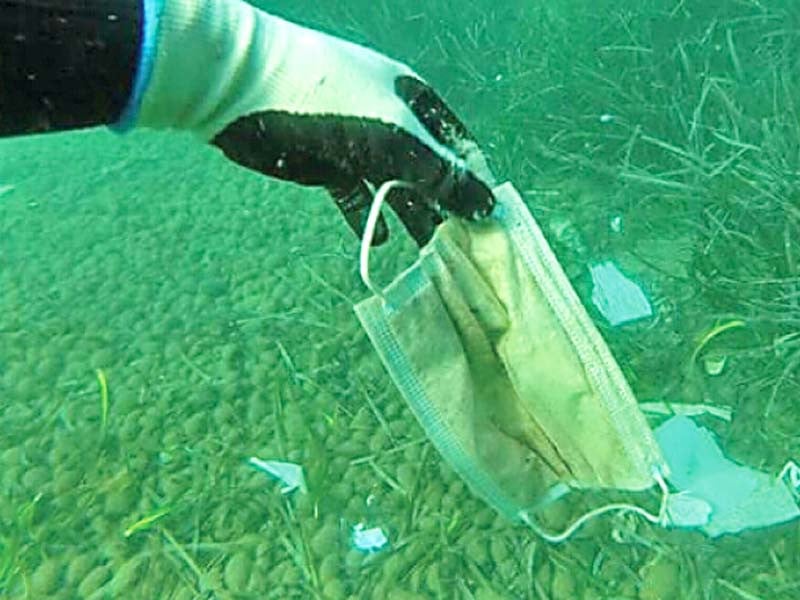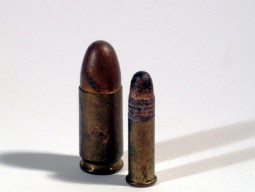
Facemasks considered the most primary and important tool in preventing the spread of novel coronavirus disease have turned out to the latest threat to the marine ecosystem, environmentalists warn.
The coronavirus pandemic has raised fears of serious effects on the human health across the globe, increasing the use of facemask and gloves, yet disposal of these items has posed a new challenge to the governments.
Already, millions of disposable facemasks and gloves are being dumped in the sea, posing threat to the aquatic life. According to experts, a mask used for preventing coronavirus can turn into almost 300,000 micro plastic particles when thrown in the sea, which will last for nearly five centuries or more to degrade into the ecosystem.
It is estimated that from 2020 to the present more than two billion masks have been thrown into the sea. According to statistics, about 130 billion masks and about 65 billion plastic gloves are used every month. It would not be wrong to say that masks and gloves have outnumbered the jellyfish in any part of the ocean, and the frightening aspect of this is that other aquatic life, including turtles, are swallowing them as their favorite food, jellyfish, wildlife experts told The Express Tribune.
Experts say no part of the world is safe, the number of masks is affecting aquatic life. Whether it is Karachi or Gwadar, there will be no other beach in the world, including Pakistan, where you will not find a mask or other equipment used to protect you from coronavirus, which is definitely dangerous and deadly for aquatic life. Garbage dumped on daily basis in the oceans is a threat and in the meantime masks are now playing a role in destroying the oceans.
According to environmentalist and meteorologist Owais Haider, about eight million tonnes of plastic is dumped into the sea every year, which estimates that 150 million tonnes of pollution already circulating in the marine environment and now in the form of masks and gloves waste destroying marine environment, as well as worsening the overall situation. Masks, gloves, sanitiser bottles and other waste generated during the pandemic are now being found in large numbers on Pakistani coastal areas in addition to the tonnes of garbage already dumped in the sea on a daily basis, Haider said.
He said a study estimated that in the UK alone, if everyone used a face mask for one day a year, it would produce an additional 66,000 tonnes of contaminated waste, while 57000 tonnes of waste will be generated in form of plastic packing.
In response, world leaders and politicians are signaling an urgent need for attention. The whole world, including Pakistan, is engaged in fighting the coronavirus. According to these statistics, the danger is increasing significantly, and these masks will have extraordinary environmental consequences on our beautiful world. "Unfortunately, we are taking steps to protect ourselves from the coronavirus, but we are also creating equipment to destroy our environment and marine life," Haider said. According to experts, mask worn to prevent from coronavirus can take up to 450 years to dissolve. Just like the first invented plastic bottle buried in the ocean floor, it took 500 years for the plastic to dissolve, with an estimated 100,000 marine organisms and more than its fish are dying. Unfortunately, fishermen are also facing huge losses and negative effects on the tourism industry, which is estimated at about 13 billion.
According to Moazzam Ali Khan, technical advisor at WWF Pakistan, masks and gloves used to protect the coronavirus can have extremely harmful effects on the environment. If plastic becomes part of the environment and is not disposed of safely, it can lead to serious problems.
He says that after being thrown into the sea, its next form is to be transformed into microplastic. A mask can dissolve into 300,000 microplastic particles. According to Moazzam Khan, about 300 microplastics have been found in one gram of sea sand. More seriously, it can enter the human diet through microplastic aquatic life, which can lead to 10 types of diseases in the human body.
Published in The Express Tribune, August 15th, 2021.

1731907834-0/Jonathan-Majors-and-Meagan-Good-(2)1731907834-0-405x300.webp)
1731906859-0/Jonathan-Majors-and-Meagan-Good-(1)1731906859-0-165x106.webp)

1724657897-0/Untitled-design-(2)1724657897-0-165x106.webp)













COMMENTS
Comments are moderated and generally will be posted if they are on-topic and not abusive.
For more information, please see our Comments FAQ